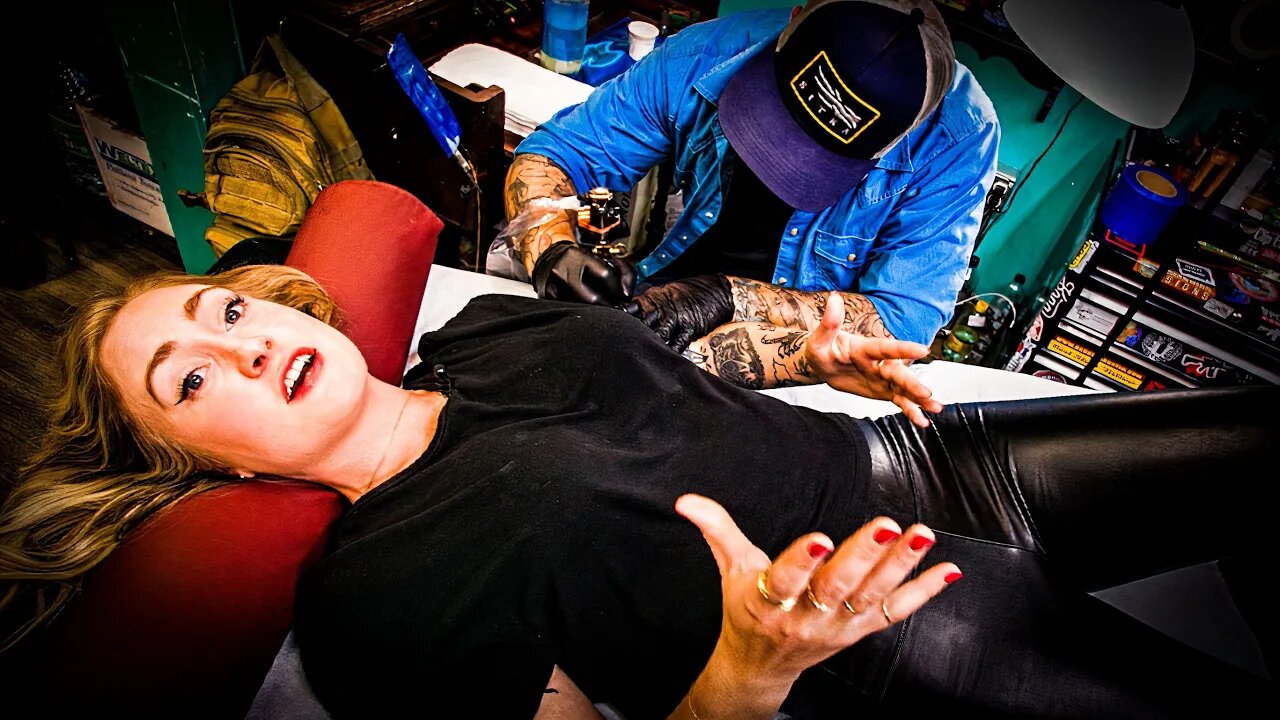Premium Only Content

'Tattoos Are a Way to Stake a Claim on Yourself'
"Government restrictions came in, which literally shut us down," says Paul Smith, who co-owns Red Stag Tattoo in Austin, Texas.
https://reason.com/video/2022/05/02/why-did-pandemic-authorities-treat-tattoo-shops-like-titty-bars/
-------
"There's a huge libertarian streak that runs through the tattooing community," says Paul Smith, who co-owns Red Stag Tattoo in Austin, Texas. "Tattoos are a way of claiming yourself and putting images or words or whatever on your body that no one else can control."
The tattooing industry was hit very hard by pandemic restrictions—even in Texas.
"Government restrictions came in, which literally shut us down," says Smith. "That cost us all of our shop's savings, all of [the owners'] personal savings. [My business partner and I] were kind of wiped out financially."
And yet Smith and his business partner decided not to apply for money from the federal COVID relief program, which was rife with fraud, and in which the federal government handed out about $800 billion to millions of small businesses. That program ultimately cost taxpayers between $170,000 and $257,000 for every job saved over 14 months of the pandemic, according to a National Bureau of Economic Research working paper.
In May 2020, Texas' Republican Governor Greg Abbott allowed hair salons, gyms, and other personal service providers to reopen. But tattoo shops weren't included.
"They took us out of that classification and put us in with businesses like titty bars," says Smith, who blames an outdated perception of tattoo shops for how regulators treat the industry.
"Used to be, [tattoos were] for… unseemly sorts of characters."
Ohio also excluded tattoo shops from the state's reopening plans, which may have been a violation of their First Amendment rights. "Both state and federal courts have recognized tattooing as a constitutionally protected form of free expression," noted Reason's Damon Root in May 2020.
Tattooing started to shed its reputation for degeneracy in 2005, when the reality show Miami Ink premiered on TLC, running for six seasons. Kat Von D, one of the stars of the show, also became a successful model and makeup entrepreneur following her breakout role.
Today, celebrity icons like Joe Rogan, Justin Bieber, Rihanna, and Lena Dunham are heavily inked, and tattoos have become much more accepted in other realms of the music and film industries. Smith says he's all for that kind of popularization.
"As a tattoo shop owner and somebody who makes my money doing it, the more people that want them, the better," says Smith.
Reason's Liz Wolfe, who owes most of her left arm tattoo sleeve to Smith, visited his shop to talk about life during and after the pandemic for tattoo artists. They also discussed the history of tattooing and where the industry and craft might be headed next.
Interview by Liz Wolfe; edited by Zach Weissmueller; camera by Andrew Miller and Weissmueller; graphics by Regan Taylor and Isaac Reese; sound design by Ian Keyser.
Photos: Louis Grasse/PxImages/Icon Sportswire EGS/Louis Grasse/PxImages/Icon Sportswire/Newscom; Abaca Press/Hahn Lionel/Abaca/Sipa USA/Newscom; Gregorio T. Binuya/Everett Collection
-
 22:42
22:42
ReasonTV
20 days agoRand Paul: Why I Oppose Trump’s Tariffs
9725 -
 LIVE
LIVE
JdaDelete
7 hours ago $0.04 earnedBanjo-Kazooie - wedNESday
471 watching -
 30:09
30:09
Iggy Azalea
8 hours ago $3.46 earnedplaying motherland
45.3K15 -
 LIVE
LIVE
SpartakusLIVE
6 hours agoDuos w/ Rallied || A Spartan and a Dragon ENTERTAIN the MASSES
431 watching -
 20:09
20:09
Exploring With Nug
14 hours ago $1.64 earnedVanished After Driving Away… I Spent the Day Searching Lakes
39.2K2 -
 1:14:13
1:14:13
Glenn Greenwald
5 hours agoLee Fang and Leighton Woodhouse Look Back on Trump’s First 100 Days; Lara Friedman on New Laws Barring Israel Criticism | SYSTEM UPDATE #446
91.5K52 -
 LIVE
LIVE
ZWOGs
11 hours ago🔴LIVE IN 1440p! - DEATH STRANDING 1 - PLAYTHROUGH | DAY 4 | - Come Hang Out!
93 watching -
 1:45:28
1:45:28
Joker Effect
3 hours agoWhy aren't you trying to enjoy yourself? Live a little! go.mother.land/Joker
15.3K1 -
 2:06:37
2:06:37
Geeks + Gamers
3 hours agoMARIO KART WARS
12.1K -
 1:14:12
1:14:12
Right Side Broadcasting Network
5 days agoLIVE: Exclusive White House Special: President Trump's First 100 Days - 4/30/25
68.3K19